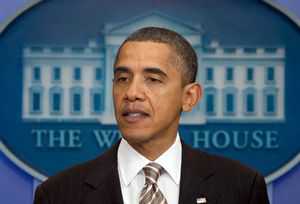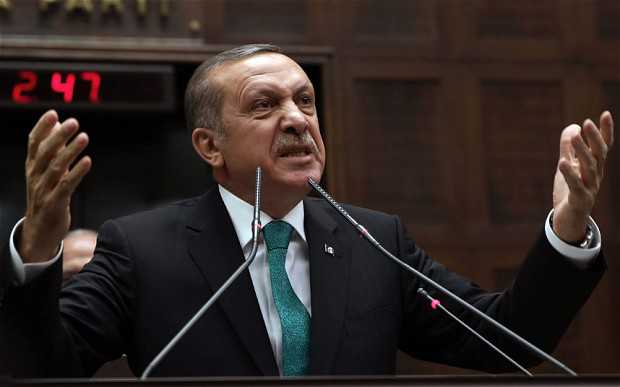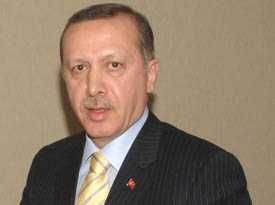The White House
Office of the Press Secretary
For Immediate Release
December 07, 2009
Oval Office
1:25 P.M. EST
PRESIDENT OBAMA: I want to extend the warmest of welcomes to Prime Minister Erdogan. I’m glad that I, personally, and the American people have a chance to reciprocate the wonderful hospitality that was extended to me when I visited Turkey in April.
As I said when I had the great honor of addressing the Turkish Parliament in Ankara, I am strongly committed to creating the best possible relationship between Turkey and the United States.
Turkey is a NATO ally, which means that we are pledged to defend each other. There are strong ties between our countries as a consequence of the Turkish American community that has been established here. We have had the opportunity to work together during this recent financial crisis, given Turkey’s role as a member of the G20. And given Turkey’s history as a secular democratic state that respects the rule of law, but is also a majority Muslim nation, it plays a critical role I think in helping to shape mutual understanding and stability and peace not only in its neighborhood but around the world.
During the course of our discussions here, we’ve had the opportunity to survey a wide range of issues that both the United States and Turkey are concerned about. I thanked Prime Minister Erdogan and the Turkish people for their outstanding contributions to stabilizing Afghanistan. We discussed our joint role in helping Iraq achieve the kind of independence and prosperity that I think has been advanced as a consequence of the election law finally being passed over the weekend.
We discussed issues of regional peace, and I indicated to the Prime Minister how important it is to resolve the issue of Iran’s nuclear capacity in a way that allows Iran to pursue peaceful nuclear energy but provides assurances that it will abide by international rules and norms, and I believe that Turkey can be an important player in trying to move Iran in that direction.
And we discussed the continuing role that we can play as NATO allies in strengthening Turkey’s profile within NATO and coordinating more effectively on critical issues like missile defense.
I also congratulated the Prime Minister on some courageous steps that he has taken around the issue of normalizing Turkish/Armenian relations, and encouraged him to continue to move forward along this path.
We reaffirmed the shared commitment to defeat terrorist activity regardless of where it occurs. I expressed condolences to the Prime Minister and the Turkish people for the recent terrorist attack that was taken there and pledged U.S. support in trying to bring the perpetrators of this violence to justice.
And finally, I complimented the Prime Minister for the steps that he’s taken, often very difficult steps, in reintegrating religious minorities and ethnic minorities within Turkey into the democratic and political process, and indicated to him that we want to be as supportive as possible in further steps that he can take, for example, assuring the continuation of the Halki Seminary and addressing the vital needs of continuing the ecumenical patriarchy within Turkey.
Over all, just to summarize, I am incredibly optimistic about the prospect of stronger and stronger ties between the United States and Turkey that will be based not only on our NATO relationship, our military-to-military relationship, our strategic relationship, but also increasing economic ties.
And one of the concrete outcomes of this trip is to follow through on discussions that I had with both Prime Minister Erdogan and President Gul in Turkey to stand up a strategic working group around economic issues and improving commercial ties. That will be launched with the participation of Secretary of Commerce Locke and our U.S. Trade Representative Ambassador Ron Kirk, along with Turkish counterparts. And we think that there is enormous potential for us to grow trade and commercial ties between the two countries.
Turkey is a great country. It is growing in influence around the world. And I am pleased that America can call Turkey a friend, and I’m pleased that I’m able to call Prime Minister Erdogan personally a friend. I’m grateful for his trip here and look forward to many years of collaboration with him to observe both the prosperity of the American people and the Turkish people.
Thank you.
PRIME MINISTER ERDOGAN: (As translated.) Thank you very much. I’m very grateful for the hospitality that both myself and my delegation have been shown since our arrival here. And I would like to once again express my thanks for that hospitality.
The fact that the President visited Turkey on his first overseas trip and that he described and characterized Turkish-U.S. relations as a model partnership has been very important for us politically and in the process that we all look forward to in the future as well. And important steps are now being taken in order to continue to build on our bilateral relations so as to give greater meaning to the term “model partnership.”
Of course, there are many sides to the development of this relationship — be it in the economic area, in the areas of science, art, technology, political areas and military areas.
We have also appointed two people from our side to act as counterparts in order to liaise with their American counterparts to continue on this process. Those two people are the Deputy Prime Minister, Mr. Ali Babacan; and the Minister of State responsible for economic affairs, Mr. Zafer Caglayan on the Turkish side. I do believe that this group is going to work to take the Turkish-American relations forward, not just in the economic area, but in all areas in general.
We, of course, have — we take joint steps on regional issues. This is in the Middle East, in Iraq, with respect to the Iranian nuclear program. We continue to have joint activity in Afghanistan, and the Turkish armed forces have taken over the command of the forces there for a third time with the additional support that we have sent to Afghanistan in the last couple of months. And there are steps that we have taken with respect to training activity and other activities in the context of provisional reconstruction teams, and we continue on that. We’ve had an opportunity to continue discussing those issues during our visit here.
Another important area, of course, is energy. Turkey is a transit country for energy issues. And the agreement has been signed for Nabucco and we are ready to take some important steps with respect to Nabucco.
We continue to talk with Azerbaijan. I do believe that positive progress will be made in this area. In addition to Azerbaijan, of course, there is the importance of companies like Statoil, Total, and British Petroleum and others.
We have also discussed relations between Azerbaijan and Armenia, which is of great importance. This is important in the context of Turkish-Armenian relations. We have discussed the Minsk Group and what the Minsk Group can do — the United States, Russia, and France — to add more impetus to that process. I can say that to have more impetus in the Minsk process is going to have a very positive impact on the overall process, because the normalization process between Turkey and Armenia is very much related to these issues. As the administration in Turkey, we are determined to move forward in this area.
Another important issue with respect for us in Turkey is the fight against terrorism. And there was a statement that was made in this very room on the 5th of November 2007, which was very important in that context, because at the time we had declared the separatist terrorist organization as the common enemy of the United States, Turkey, and Iraq, because terrorism is the enemy of all mankind.
Our sensitivity and response to terrorism is what we have displayed when the twin towers were hit here in the United States. Wherever a terrorist attack takes place our reaction is always the same, because terrorism does not have a religion — a homeland. They have no homeland, no religion whatsoever.
We have also had opportunity to discuss what we can do jointly in the region with regard to nuclear programs. We as Turkey stand ready to do whatever we can to ensure a diplomatic solution to the nuclear issue in our region. And we stand ready as Turkey to do whatever we can do with respect to relations between Israel and the Palestinians, and Israel and Syria, because I do believe that, first and foremost, the United States, too, has important responsibility in trying to achieve global peace.
And we, too, must lend all kinds of support that we can in our regions and — in our respective regions and in the world in general in trying to achieve global peace, because this is not the time to make enemies, it’s the time to make friends. And I believe that we must move hand in hand towards a bright future.
Thank you once again.
PRESIDENT OBAMA: Thank you.
All right, where’s Ben Feller? There you are.
Q Thank you sir. I’d like to ask you briefly about a domestic issue, that being the economy, heading to your speech tomorrow. Do you support the use of federal bailout money to fund job creation programs? Is that an appropriate use of that money? Is that something that you plan to support tomorrow?
PRESIDENT OBAMA: You know, Ben, it would be a mistake for me to step on my speech tomorrow by giving you the headline today.
Q Not that big a mistake. (Laughter.)
PRESIDENT OBAMA: But let me speak generally about what we’ve seen. On Friday we got the best jobs report that we’ve gotten in a very long time. And it significantly beat expectations. At minimum, it showed that for all practical purposes, we’ve stopped losing jobs. And that’s consistent with the fact that in the third quarter we saw the economy grow.
My first job when I came into office was to make sure that we got the financial crisis under control and that we tried to limit the devastating effects that it was having on the real economy. We have had a very tough year, and we’ve lost millions of jobs. But at least now we are moving in the right direction.
What my speech tomorrow will focus on is the fact that having gotten the financial crisis under control. Having finally moved into positive territory when it comes to economic growth, our biggest challenge now is making sure that job growth matches up with economic growth. And what we’ve seen is, is that companies shed jobs very quickly, partly induced by the panic of what was happening on Wall Street, and they are still tentative about hiring back all those people who were laid off. Also what we’re seeing is some long-term trends where companies are becoming so efficient in terms of productivity that they may feel that they can produce the same amount of goods or services without as many employees.
So those present some particular challenges, given the fact that we lost over 3 million jobs just in the first quarter of this year before any of the steps we took had a chance to take effect.
With respect to TARP specifically, I think you saw stories today and you’ve seen stories over the last several weeks that TARP has turned out to be much cheaper than we had expected, although not cheap. It means that some of that money can be devoted to deficit reduction. And the question is are there selective approaches that are consistent with the original goals of TARP — for example, making sure that small businesses are still getting lending — that would be appropriate in accelerating job growth?
And I will be addressing that tomorrow. But I do think that, although we’ve stabilized the financial system, one of the problems that we’re still seeing all the time — and I heard about it when it was in Allentown just this past week — was the fact that small businesses and some medium-sized businesses are still feeling a huge credit crunch. They cannot get the loans that they need to make capital investments that would allow them to then expand employment. And so that’s a particular area where we might be able to make a difference.
Is there somebody in the Turkish delegation that wants to call on a reporter?
Q Mr. President, is there any new and concrete U.S. action plan for disarmament and the elimination of the PKK terror organization in northern Iraq? Thank you, sir.
PRESIDENT OBAMA: Well, what the Prime Minister and I have discussed is coordinating closely in dealing with the problem of the PKK. We have stated before and I have reaffirmed since I came into office that the United States considers PKK a terrorist organization, and that the threat that it poses not only in Turkey but also in Iraq is one that is of deep concern. And as NATO allies, we are bound to help each other defend our territories. More broadly, I think that it is important for us to have a consistent position with respect to terrorism wherever it takes place.
So we discussed how we can coordinate militarily. I will tell you that with respect to the issue of the PKK, I think that the steps that the Prime Minister has taken in being inclusive towards the Kurdish community in Turkey is very helpful, because one of the things we understand is, is that terrorism cannot just be dealt with militarily; there is also social and political components to it that have to be recognized.
With respect to Iraq, I think the degree to which the Kurdish population within Iraq feels effectively represented within the central government in Baghdad, to the extent that we can resolve some long-term pressing issues like Kirkuk, the more I think that Kurds will recognize that their interests are not in supporting any kind of military activity but rather in working through conflicts politically, in a way that allows everybody to be prosperous. And that’s the kind of process that we would encourage.
Okay? Thank you very much, everybody. Happy holidays.
END
1:45 P.M. EST





